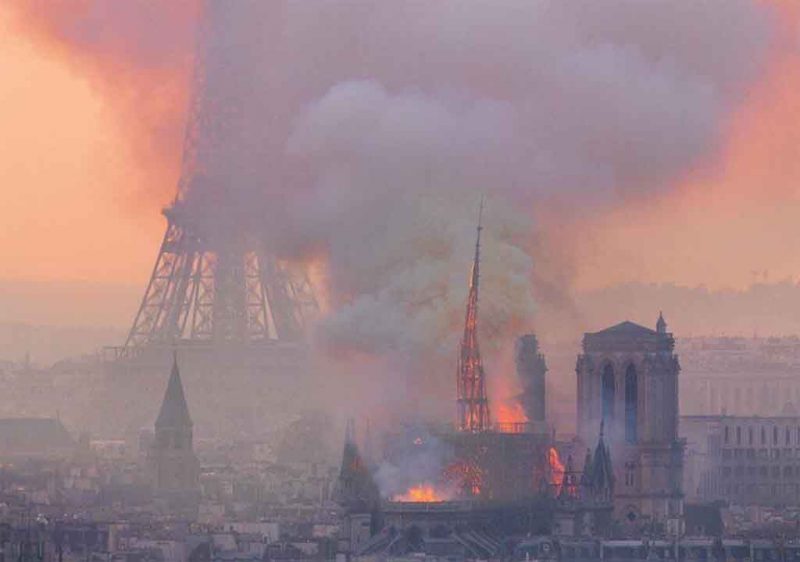Christianity Burned Long Before Notre-Dame
After months of increasing vandalism of Christian churches in France by secular humanists and violent Muslims, the world was shocked to see that Notre-Dame cathedral had caught fire at some point during the renovation process.
The media immediately pointed to “Right-wing conspiracy theories” that a Muslim had done it, but in reality, no one would be shocked by that outcome; it is typical, after all, of what happens when you import a clash of civilizations into your own country.
We expect our media to tell us one thing, mainly by obscuring information contrary to their agenda, and for the fringe to speak up without any clear proof having yet emerged. Conspiracy theories are metaphor more than reality.
More important may be the question raised by Michel Houellebecq in his epic novel of Islamic occupation of Europe, Submission. He asks whether Christianity can save the West, and expresses both hope and skepticism, but mostly disbelief.
Faith in Christianity has been falling for centuries, mainly because a highly symbolic religion which relies on mysticism seems like nonsense when confronted with science and technology. We no longer believe in a God who reaches down to do things directly.
Church membership has fallen since the 1990s as the church has become liberalized, idiocratic, and mass culture oriented:
Gallup finds the percentage of Americans who report belonging to a church, synagogue or mosque at an all-time low, averaging 50% in 2018.
U.S. church membership was 70% or higher from 1937 through 1976, falling modestly to an average of 68% in the 1970s through the 1990s. The past 20 years have seen an acceleration in the drop-off, with a 20-percentage-point decline since 1999 and more than half of that change occurring since the start of the current decade.
The early church focused on the superstitious and symbolic side of its religious faith because this enabled it to control the proles; unfortunately, for the middle classes, this positioned it against science, technology, and common sense. In our world, a few loaves of bread and fish do not magically become enough to feed thousands, and if the authorities of the day crucify you, you stay dead.
If Europe has any native faith, it is more like paganism, where we observe cycles in nature and patterns that emerge, and attempt to unite the forms in our minds with those, so that we can understand the world and influence it with our will.
Even more, what made Western Civilization was complete before Christianity was even created; with the Greeks, the wandering Yamnaya, Indo-European faiths and languages, we already had the West.
Christianity became popular among our leaders, in my reading of history, for a singular utility: it imposed a clear moral code, similar to our laws, which could be used to control our rising population, especially of those who would not have existed without civilization.
We liked the chaste sexual morality in particular, since the pagans did not preach, but only offered examples, and it was clear that the best people stayed essentially virginal while the proles, peasants, serfs, and slaves rutted with great abandon in the fields.
At this point, it makes sense to accept the Christians and pagans as allies in the quest to restore Western Civilization, but to be realistic about the fact that Christianity is on its way out and converting everyone to Jesus alone will not save the West.
Christianity helped us as our societies grew, but then succumbed to its weakness, which is that it was based on a morality of the individual instead of one related to patterns larger than the individual. The personal God lends himself to democracy.
This makes things complicated because any thorough reading of the Bible shows us a document that detests democracy, is fiercely nationalistic, and loathes the kind of “do whatever you want, it’s all cool man” outlook that people attribute to Jesus.
However, when you tell people that the question for them is personal moral salvation, that they have a personal relationship with God, and that their morality should be based on how they treat other individuals in the context of those individuals alone and not civilization, that sets up a religion for takeover.
Unlike the pagans, who told their faith through stories rich in metaphor, Christianity relies on symbolism, or the use of a single good/bad pair to control a story. God steps in and achieves symbolic victory many times.
This also creates the clash that Julius Evola identified in Christianity. Its procedural morality lends itself to misinterpretation, where the actual understanding of the faith requires cumulative knowledge and deep analysis.
These weaknesses allowed Christianity to be taken over from within by the herd, which promptly changed it into what human herds always turn everything into, namely the idea that each individual is sacred and equal and that they can do whatever they want without consequences.
Crowdist takeovers of this type render anything into the same fearful but greedy mass individualism that is found in corporate jobs, democracy, mass culture, advertising, the hipster music scene, and any group of outcasts mobilizing against hierarchy anywhere.
This means that the sadness of the Notre-Dame fire is not the fire itself, but the neglect that allowed it to happen; behind that, the lack of faith that allowed the neglect to be accepted. What was once a unifying source of faith is now not viewed as essential.
As we go into the future, we should hang on to the past — all of it, even the dark parts — but we need to learn from it. If we have lost faith in something, it will not save us until we find what our faith requires in order to exist and resurrect that first.
Tags: catholicism, christianity, faith, notre-dame, paganism, religion










